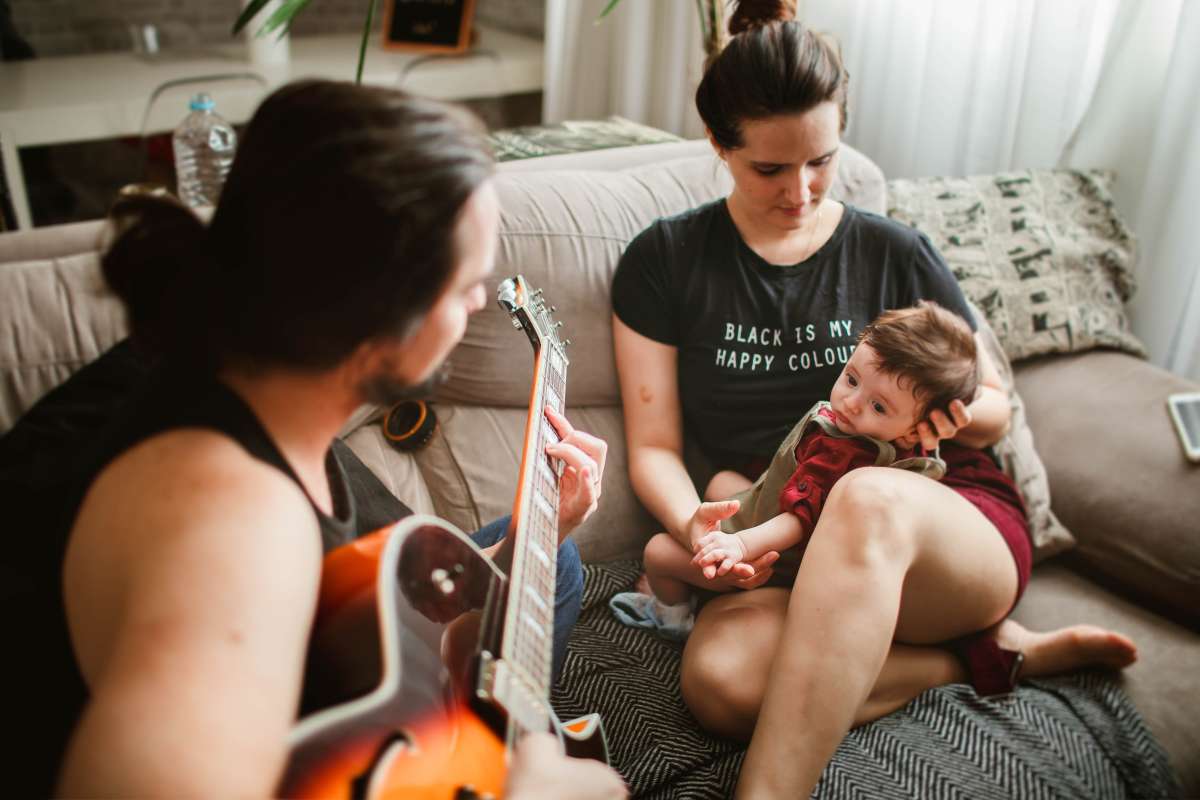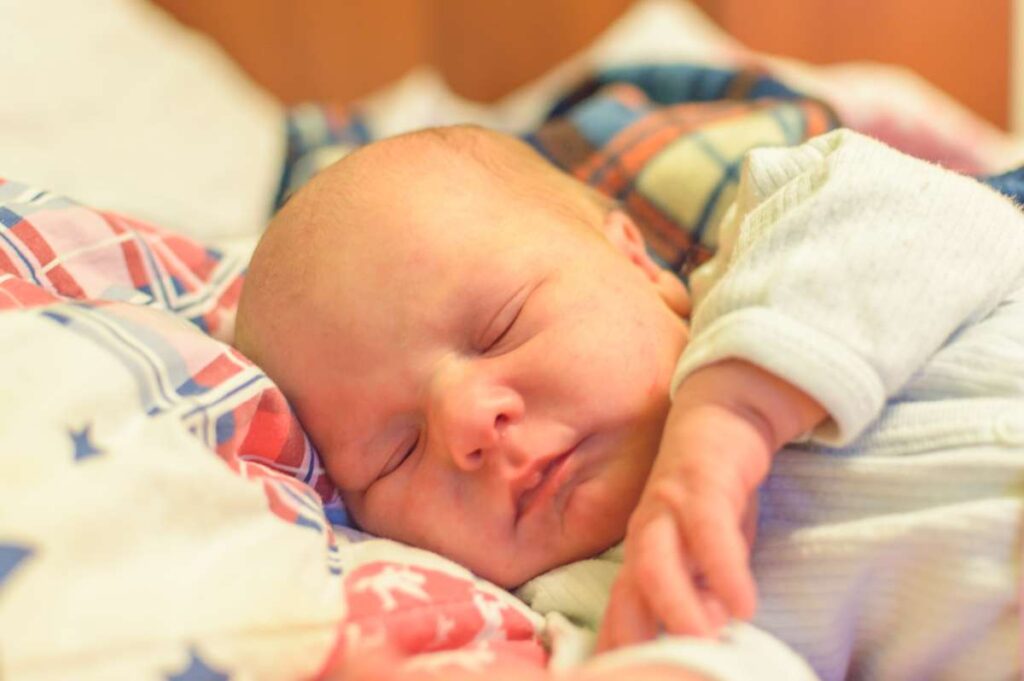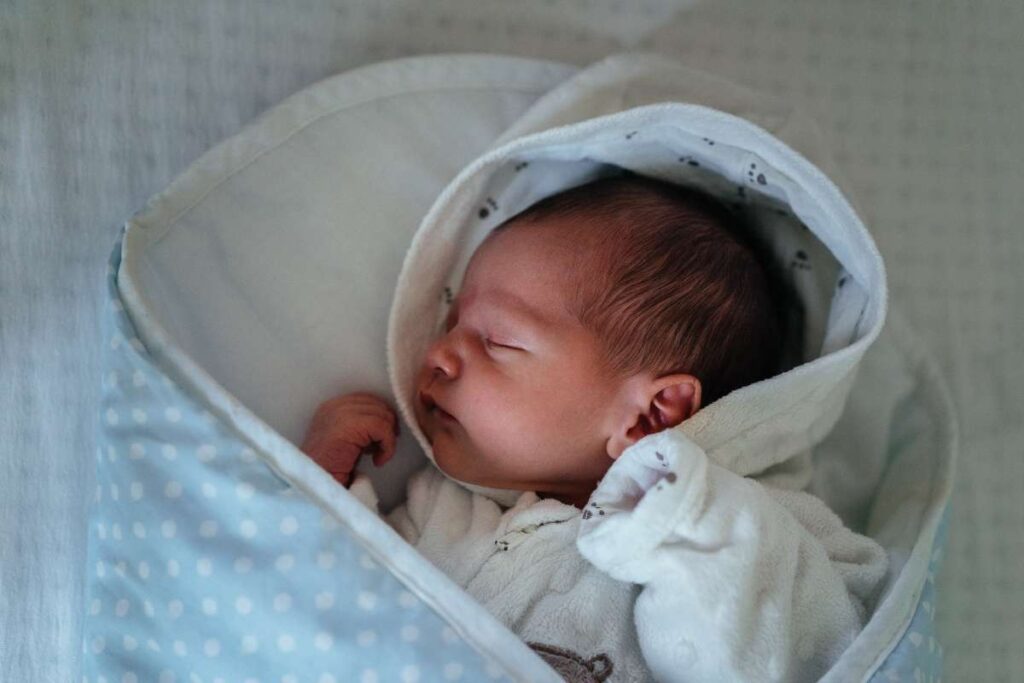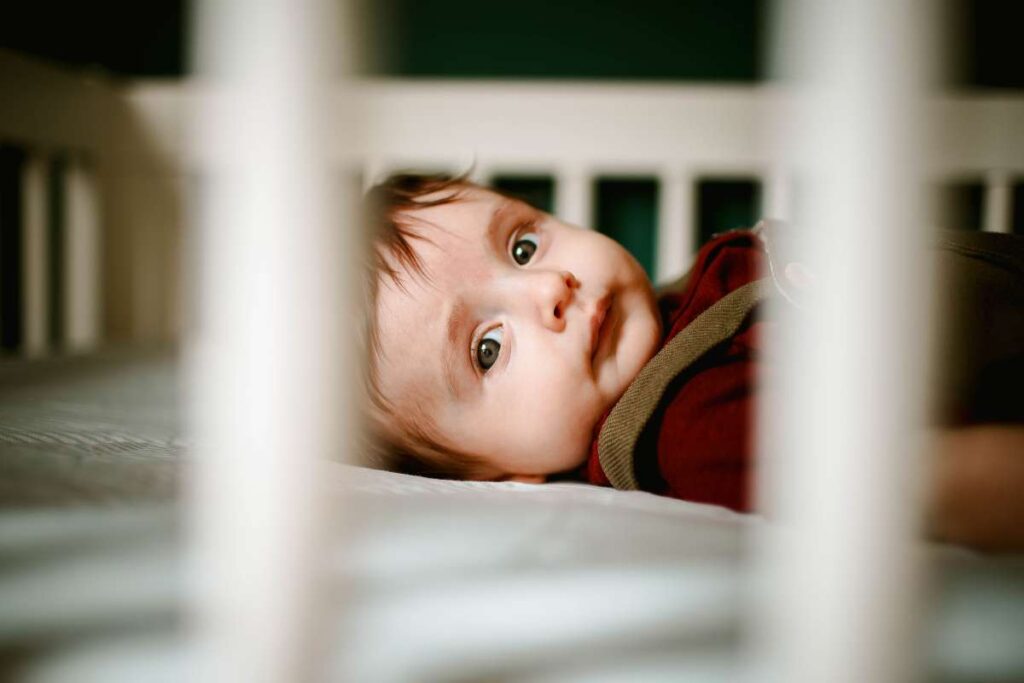Your infant likely associates music with falling asleep. Certain objects, such as blankets, plush animals, or pacifiers, become associated with sleep for certain infants. Behaviors, including as being rocked to sleep or dozing off while breastfeeding, have also been linked to sleep.
Even among older kids, it's not uncommon for them to develop sleep associations, like dozing off in front of the TV or snuggling up next to a parent.
Associative memory is not always negative. In the first few months, when feedings are more frequent and overnight wakings are the norm, a pattern that helps your baby nod off can be quite useful.
Good sleep memories aren't necessarily connected to a parent. The baby goes back to sleep (with their blanket or soother, for instance) without disturbing the parent up when it wakes up in the middle of the night.
The difficult issue about breaking sleep associations is that they tend to be habit forming. Expecting to wake up every three hours to feed and soothe a two-month-old back to sleep is reasonable, but doing the same with a four-year-old can be exhausting and upsetting. Certain links between the activities of the night before and the following morning are especially troublesome.
Thumb and finger sucking are bad habits that are hard to quit and can have lasting effects on your teeth, palate, and fingers. A pacifier is preferable to the thumb since it is simpler to break the habit of using it as a soother.
It's also not a good idea to fall asleep when nursing. The nutritional and dental issues are severe, and nighttime feedings need the parent to get up. In the first six months, it is common for infants to nod off while nursing. However, after roughly six months, it is best to cease feeding your baby before they fall asleep.
Sleep association disruption can be accomplished in a variety of ways. To help your child learn to fall asleep on their own, you may need to leave them in bed alone at first. In my opinion, this is best done between the ages of 6 and 12 months, while the exact age will vary from child to child and family to family.
If you don't have to get up in the middle of the night to switch the music back on, playing music as your infant falls asleep is probably not a big deal. In time, you may decide to limit music listening to just before bedtime, shutting it off when your child begins to show signs of drowsiness and letting him go off to sleep on his own.
FAQs About Baby Nursery
Limit it to 30 minutes: Kennedy says not to let lullabies run all night because the brain stays attuned to sound and might not get into a deep sleep. Playing music for a half-hour after bedtime is good.
A study on the effects of background music and sleep quality found that children who listen to background music at naptime and bedtime had improved sleep quality. Another study concluded that “relaxing classical music is an effective intervention in reducing sleeping problems.
How your baby reacts to sound may depend on her temperament as well. Some babies are more sensitive to things around them so they may react more to loud noises. However, the everyday sounds of your home shouldn't faze her. She'll probably be able to sleep right through them.
It's tempting to keep the white noise going through the night, but it's not recommended. "Operate the infant sound machine for a short time," Schneeberg advises. She recommends using a timer or shutting it off once your baby is asleep, provided you're still awake.
The most common sleep props are nursing/bottle feeding, rocking, patting, singing, bouncing, pacifiers, and the presence of a parent (sitting in the room, laying with the child, co-sleeping, etc.).

How Babies Can Be Put To Sleep By Music And Why It Works
In reality, infants and grownups are more alike than different. The essential architecture of a baby's brain are intact and functional, despite the fact that their brains aren't fully formed and their bodies are considerably smaller than yours.
Developmental Gains for Infants
Their brain's auditory cortex, which is responsible for processing speech and music, is included in this. The practise of playing lullabies to an unborn child is gaining popularity.
Talking to your unborn child is recommended by paediatricians and other baby specialists. If you talk to your infant often, he or she will get more familiar with your voice. So much so that one piece of advice is to put headphones on your tummy and play music for your developing kid.
This is due to the fact that the temporal lobe of the cerebral cortex, where the auditory cortex resides, is one of the earliest regions of the human brain to develop during gestation. When your unborn child is in the early phases of development, stimulating and bonding with them through sound is crucial.
Intrauterine Exposure To Music
Introducing your unborn kid to music during pregnancy can set the stage for a positive reaction and appreciation of music in the future.
If you start playing baby sleep music when you're still pregnant, it will be second nature to utilise music later on while your child is in their crib trying to nod off. It's likely that they've heard the music before. Therefore, it will induce feelings of security and familiarity in your infant, paving the way for a restful night's sleep.
Inducing a peaceful slumber in a newborn with music is a lovely experience. To calm your nerves, concentrate your thoughts, and find peace and relaxation, put on a recording of one of your favourite songs and play it.
You have experienced the transformative effects of music on your own mind, body, and soul. Babies feel the same soothing effect when their auditory cortices are subjected to soothing baby sleep music.
Some sounds, like those of nature or a gentle thunderstorm, can calm a baby's developing brain in much the same way that they can help you go off to sleep. By following the instructions, your infant can relax and fall into a restful sleep.
The Baby-Sleep Music You Choose Is Crucial, But Not All Music Is Created Equal
You probably learned something about human nature in college, and that is that we are capable of falling asleep even in the midst of the most raucous and chaotic of conditions. The opposite is true with your newborn. Heavy metal, or any music with a high pitch or low bass, is not conducive to a restful night's sleep for your kid.
For some reason, the auditory brain responds positively to both of these sounds, making them feel more like a stimulant than a relaxing. It's important to know that not all tunes are created equal when it comes to helping your infant nod off. You've come to the right site if you're in need of some tips on how to pick the most effective sleep music for babies.
Baby Sing-Alongs
Many parents find comfort in singing lullabies to their children before bed. Your baby will feel more at ease and familiar with the bedtime routine when you sing him or her a lullaby. When it's time to put your child to sleep, it's important to play soothing music, but you need to be selective. There are lullabies that are more suited to being sung in the background of a fun game or a long car ride.
To help you go off to sleep, pick an album of lullabies. These lullabies are composed using soft instrumentation and ambient sounds that won't be too stimulating for your infant's developing brain.
Baby classical music is another common alternative for lullabies before bedtime. Classical music is ideal for infants because it is free of lyrics, which can be confusing and overpowering for their developing minds, and because it features softer instruments and tones rather than louder ones.
The classical music that is played in elevators and while you are on hold is ideal for putting your kid to sleep.
Spa music is yet another popular and successful option. It is common practise for spas and masseuses to play soft, lullaby-like music for infants when clients are relaxing.
Music that features environmental noises like waterfalls and rustling trees, as well as wind instruments, string instruments, and the piano, is common at spas and massage parlours.
The sum of these noises is a symphony of harmonious tunes that can soothe even the most wilful infant.
The Value of Music for Putting Baby to Sleep
Playing soothing music for infants before bed helps them drift off to sleep more quickly and guarantees a more restful night's sleep. Although this is an admirable goal, there are other advantages to putting your kid to sleep with some music.
If your child is experiencing discomfort from teething or growth, playing soothing music to put them to sleep may help. An intriguing investigation was undertaken by a London hospital. Evidence suggested that listening to music helped young patients cope with pain.
One prominent explanation in the scientific community is that music triggers a response in the brain's emotional centre. It has been theorised that listening to music can prevent the brain from registering painful impulses.
The right kind of music can help put a baby to sleep in a way that words can't.
Baby's general brain development can be boosted by playing music while they sleep. The right kind of music can help put a baby to sleep in a way that words can't. The same holds true for infants as it does for mature humans.
Babies that are put to sleep to music will be exposed to a wide range of affective experiences. Your child's emotional development can be aided by these experiences.
The world will become a more interesting place as your infant begins to experience a wider range of emotions. You and the world around you will become more real to your infant.
Your child's self-understanding and pattern recognition will both benefit from this little emotional stimulation. Both critical thinking and problem solving rely heavily on the ability to spot patterns.

Techniques for Putting a Newborn to Sleep with Music
Playing soothing music to put your baby to sleep may seem like a straightforward activity with few moving parts about which to fret. That's not quite right. If you want to play music for your infant, but aren't having much success, there are a few things you can do to improve the experience.
Placement
The volume and location of the music player for your youngster go hand in hand.
If you want your infant to hear the music from a far away device, you'll need to turn up the volume. First, you can try setting up the gadget right next to the crib, or even just a few feet away. By doing so, you can rest assured that the music won't be too intense, thus rousing the infant instead of calming him or her.
As a bonus, this will help your infant get into the habit of sleeping in his or her cot.
Volume
The loudness of the music being played is a crucial aspect that must be addressed right away. It makes sense that more stimulating music would be overwhelming for your kid.
Soothing music played at an extremely loud volume can actually stimulate your baby's brain as it absorbs the unfamiliar sounds, preventing the brain from entering sleep mode.
Versus Repetition, a Playlist
This is a matter of taste that will vary from infant to infant. Try a variety of nighttime songs to see which ones your infant enjoys the most. Another possibility is that your infant enjoys listening to the same song over and over again. Try them out and see which one works better for you.
Duration
Playing soothing music for your infant is recommended by psychologists and sleep experts, but only for a few hours before bedtime. The music should be turned off as soon as you notice your infant nodding out.
This will stop the music from being your baby's go-to for falling asleep. If your infant learns to rely on music as a means to nod off, they may start seeking out sleep aids wherever they go.
The music should play for at least two hours before bedtime. This will put them in a better frame of mind to sleep without fostering any sort of dependency.
How to Pick the Perfect Lullabies for Baby
Babies have a lot to learn, and that includes how to go to sleep at a reasonable hour. While some infants may have little trouble drifting off to sleep, others may benefit from baby sleep music.
As such, music can play a significant role in sleep rituals and sleep training by providing clear and reassuring indications that it is time to go to bed. However, music designed for infants to sleep should be utilised with caution and precision.
To make matters worse, when the incorrect kind of music is utilised in the wrong context, it can actually make things worse. The trick is to make the music as dull as possible and to stop playing it before the kid goes to sleep.
Leaving infants to sleep with the incorrect music, or simply any music, might have negative consequences. To put a baby to sleep, we do not believe music is particularly helpful.
If music is played at bedtime on a regular basis, the infant will begin to associate it with falling asleep, a phenomenon known as "sleep onset association."
Then, it needs to be available anywhere the baby stays, including at grandma's, daycare, hotels, and other unfamiliar places.
Understanding Baby Sleep Music
- A newborn may find it easier to drift off to sleep if music is played, but if the youngster grows reliant on this technique, he or she may have trouble falling asleep when away from home.
- Sound sleepers are full sleepers, and it is feasible to teach a newborn to sleep through a variety of noises and without many sleep aids.
- Sleep rituals, which can include the use of music, are an effective way to prepare a young child for sleep. Dimmed lights and soft music can assist facilitate this custom.
- It's recommended that you listen to upbeat, stimulating music while in the elevator. Parents who want to use music to help their children drift off to sleep should play gentle lullabies, classical music, or "spa music" instead of loud rock.
- If outside noises are too stimulating for a baby, parents can use a white-noise sound machine to create a soothing environment. As opposed to being activated at specific intervals, a continuous one is preferable.
Inappropriate sleep onset associations are also known as sleep crutches or sleep props. They are stimuli or conditions that babies cannot replicate themselves, and so when they awake in the night, they lack the tools to help them relax and fall back asleep.
Instead for teaching a baby to be a full sleeper, able to sleep under various conditions with typical ambient noise and with very few sleep crutches.
That doesn’t mean the music has no place at bedtime. Bedtime rituals are still important, and they can incorporate music. Some parents use music and lowered lights, for example, to mark the transition from family after-dinner time to bedtime-routine time. However, the wrong choice of music can stimulate a baby to wakefulness, making bedtime harder instead of easier.
If the ambient noise is too much for a baby to cope with, parents may need to mask or block it. Music may seem like a good option, but a white noise machine may be a more useful fit.
If music is being used to block sound, we think a sound machine is probably a better choice since the sound provided by this machine is so consistent. A sound machine that clicks off after a set period may also trigger an awakening, and if the baby is dependent on it to fall asleep, it may become another sleep crutch that keeps them awake in the middle of the night. So if a white noise machine is necessary, it should run continuously.
Conclusion
It's not uncommon for older kids to develop sleep associations, like dozing off in front of the TV or snuggling up next to a parent. To help your child learn to fall asleep on their own, you may need to leave them in bed alone at first. Playing music as your infant falls asleep is probably not a big deal. In time, you may decide to limit music listening to just before bedtime. When your unborn child is in the early stages of development, stimulating and bonding with them through sound is crucial.
This can set the stage for a positive reaction and appreciation of music in the future. Some sounds, like those of nature or a gentle thunderstorm, can calm a baby's developing brain in much the same way that they can help you go off to sleep. Heavy metal, or any music with a high pitch or low bass, is not conducive to a restful night's sleep for your infant. Playing soothing music for infants before bed helps them drift off to sleep more quickly. Music that features environmental noises like waterfalls and rustling trees is common at spas and massage parlours.
An investigation suggested that listening to music helped young patients cope with pain. Playing soothing music for your infant is recommended by psychologists and sleep experts, but only for a few hours before bedtime. This will put them in a better frame of mind to sleep without fostering any sort of dependency. The loudness of the music being played is a crucial aspect that must be addressed.
Content Summary
- Your infant likely associates music with falling asleep.
- Certain objects, such as blankets, plush animals, or pacifiers, become associated with sleep for certain infants.
- Behaviors, including as being rocked to sleep or dozing off while breastfeeding, have also been linked to sleep.
- Associative memory is not always negative.
- Good sleep memories aren't necessarily connected to a parent.
- The difficult issue about breaking sleep associations is that they tend to be habit forming.
- It's also not a good idea to fall asleep when nursing.
- In the first six months, it is common for infants to nod off while nursing.
- However, after roughly six months, it is best to cease feeding your baby before they fall asleep.
- Sleep association disruption can be accomplished in a variety of ways.
- To help your child learn to fall asleep on their own, you may need to leave them in bed alone at first.
- If you don't have to get up in the middle of the night to switch the music back on, playing music as your infant falls asleep is probably not a big deal.
- In time, you may decide to limit music listening to just before bedtime, shutting it off when your child begins to show signs of drowsiness and letting him go off to sleep on his own.
- The practise of playing lullabies to an unborn child is gaining popularity.
- Talking to your unborn child is recommended by paediatricians and other baby specialists.
- If you talk to your infant often, he or she will get more familiar with your voice.
- So much so that one piece of advice is to put headphones on your tummy and play music for your developing kid.
- When your unborn child is in the early phases of development, stimulating and bonding with them through sound is crucial.
- Intrauterine Exposure To Music Introducing your unborn kid to music during pregnancy can set the stage for a positive reaction and appreciation of music in the future.
- If you start playing baby sleep music when you're still pregnant, it will be second nature to utilise music later on while your child is in their crib trying to nod off.
- Inducing a peaceful slumber in a newborn with music is a lovely experience.
- Babies feel the same soothing effect when their auditory cortices are subjected to soothing baby sleep music.
- By following the instructions, your infant can relax and fall into a restful sleep.
- Heavy metal, or any music with a high pitch or low bass, is not conducive to a restful night's sleep for your kid.
- You've come to the right site if you're in need of some tips on how to pick the most effective sleep music for babies.
- Baby Sing-Alongs Many parents find comfort in singing lullabies to their children before bed.
- Your baby will feel more at ease and familiar with the bedtime routine when you sing him or her a lullaby.
- When it's time to put your child to sleep, it's important to play soothing music, but you need to be selective.
- To help you go off to sleep, pick an album of lullabies.
- Baby classical music is another common alternative for lullabies before bedtime.
- The Value of Music for Putting Baby to Sleep Playing soothing music for infants before bed helps them drift off to sleep more quickly and guarantees a more restful night's sleep.
- Although this is an admirable goal, there are other advantages to putting your kid to sleep with some music.
- If your child is experiencing discomfort from teething or growth, playing soothing music to put them to sleep may help.
- Evidence suggested that listening to music helped young patients cope with pain.
- One prominent explanation in the scientific community is that music triggers a response in the brain's emotional centre.
- It has been theorised that listening to music can prevent the brain from registering painful impulses.
- The right kind of music can help put a baby to sleep in a way that words can't.
- Baby's general brain development can be boosted by playing music while they sleep.
- Babies that are put to sleep to music will be exposed to a wide range of affective experiences.
- Your child's emotional development can be aided by these experiences.
- The world will become a more interesting place as your infant begins to experience a wider range of emotions.
- You and the world around you will become more real to your infant.
- Your child's self-understanding and pattern recognition will both benefit from this little emotional stimulation.
- Techniques for Putting a Newborn to Sleep with Music Playing soothing music to put your baby to sleep may seem like a straightforward activity with few moving parts about which to fret.
- If you want to play music for your infant, but aren't having much success, there are a few things you can do to improve the experience.
- Placement The volume and location of the music player for your youngster go hand in hand.
- If you want your infant to hear the music from a far away device, you'll need to turn up the volume.
- Duration Playing soothing music for your infant is recommended by psychologists and sleep experts, but only for a few hours before bedtime.
- This will stop the music from being your baby's go-to for falling asleep.
- The music should play for at least two hours before bedtime.






